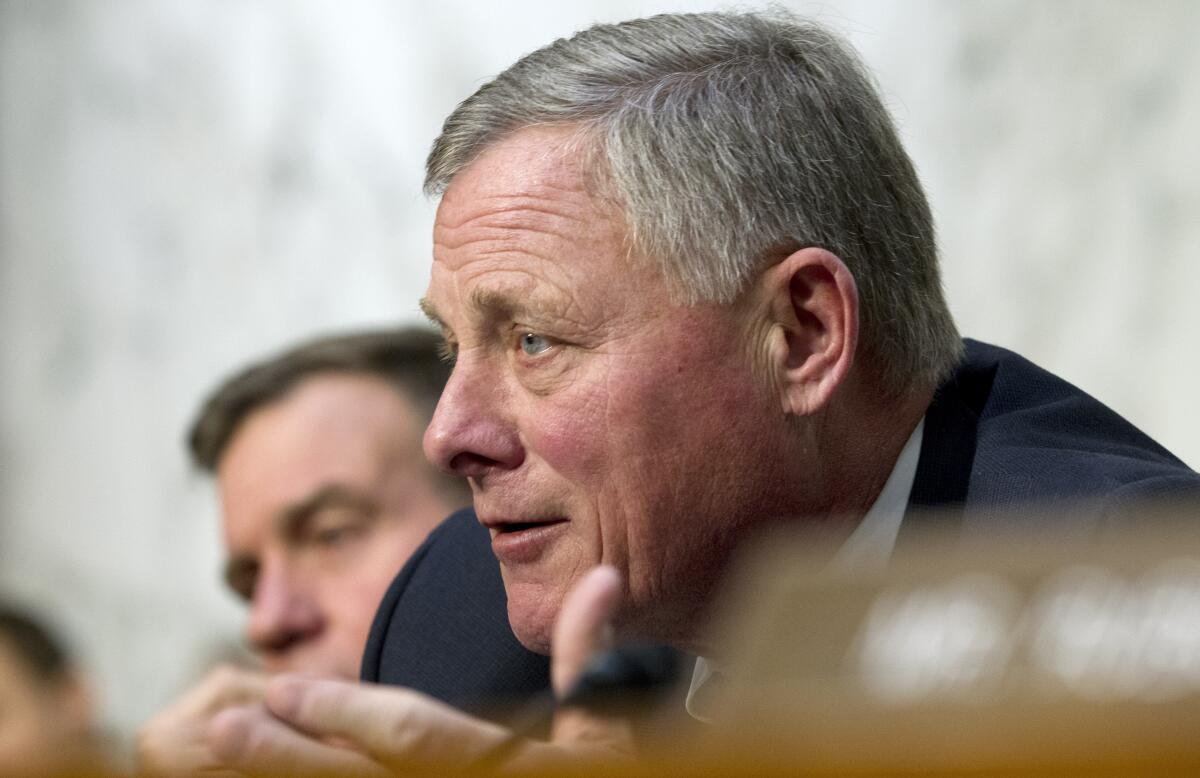Sens. Burr and Loeffler cashing in on coronavirus? Why are politicians even allowed to own stock?

- Share via
How bad does a Republican senator have to screw up to draw an on-air condemnation from Fox News’ Tucker Carlson?
Evidently, he has to appear both self-serving and hypocritical.
The target of Carlson’s ire is Sen. Richard Burr (R-N.C.), the subject of twin exposes this week by ProPublica and NPR. The pieces showed how Burr painted a far more negative picture of the coronavirus’ impacts in private than he did in public, and how he spared his nest egg from the carnage on Wall Street with some well-timed stock sales.
Burr has defended his actions and called on the Senate Ethics Committee to look at his stock trades.
Of course, the Twitterverse reacted by creating a new hashtag and making it a trending topic: #Burrisma.
If you haven’t read the work done by ProPublica and NPR, you should. Pro Publica reported that Burr — the chairman of the Senate Intelligence Committee, which was receiving early briefings on the coronavirus threat — sold up to $1.7 million worth of stocks shortly before the intensifying outbreak sent the markets into free fall. NPR, meanwhile, obtained a recording of Burr, who had publicly played down the risks, privately telling influential constituents that the virus was going to be far more disruptive than the Trump administration was letting on at that point.
Carlson has evolved into an angry populist, and Burr’s reported behavior fits into the narrative of Washington elites looking out for No. 1 while ordinary Americans suffer. Still, it may not be fair to single out Burr; many Republicans were giving the public bad advice on coronavirus until recently because they mindlessly parroted President Trump.
Regardless, the enduring problem for lawmakers is that so many of them own stocks, which inevitably raises the specter of a conflict of interests. Even if they put their holdings into a blind trust or have a professional investment advisor handle all their trades, the reports they have to sign and file with the Senate make them aware of everything they own.
Take, for instance, Georgia’s newly appointed Republican senator, Kelly Loeffler, who reported selling up to $3.2 million in stocks and stock options that she and her husband owned after Loeffer was briefed about the coronavirus outbreak; the couple also bought up to $500,000 worth of stock in software companies whose products are used by millions of telecommuters. Loeffler says all those trades were made without their knowledge by “third-party advisors,” so maybe this is just a case of people who can afford to hire professional help faring better than the typical worker bee with a suddenly much smaller 401(k).
That’s not a good look, Kelly! Worse, it doesn’t address the larger question of why a member of Congress should own shares in companies whose profits may be directly affected by the federal government’s response to the outbreak. Granted, the outbreak is going to have an enormous effect on companies in every industry. But companies that make software used to connect computers at home to computers at the office? Their interests are, shall we say, unique.
Some in the media have put a partisan spin on this, noting that several Republican senators took steps that mirrored Loeffler’s and Burr’s. (Fox News, meanwhile, led its story with a stock sale by California Democrat Dianne Feinstein’s husband, ignoring the fact that her husband is an active trader who regularly buys and sells hundreds of thousands of dollars’ worth of various companies’ stocks.) The problem here isn’t confined to one party or one chamber. Lawmakers at all levels of government should not own shares of individual companies’ stock or invest in industry-specific funds. The appearance of a conflict of interests is inescapable.
Oh, and yes, they should stop giving private warnings that conflict with their public statements. Unless, of course, they want to be featured on Tucker Carlson’s show.
More to Read
A cure for the common opinion
Get thought-provoking perspectives with our weekly newsletter.
You may occasionally receive promotional content from the Los Angeles Times.










